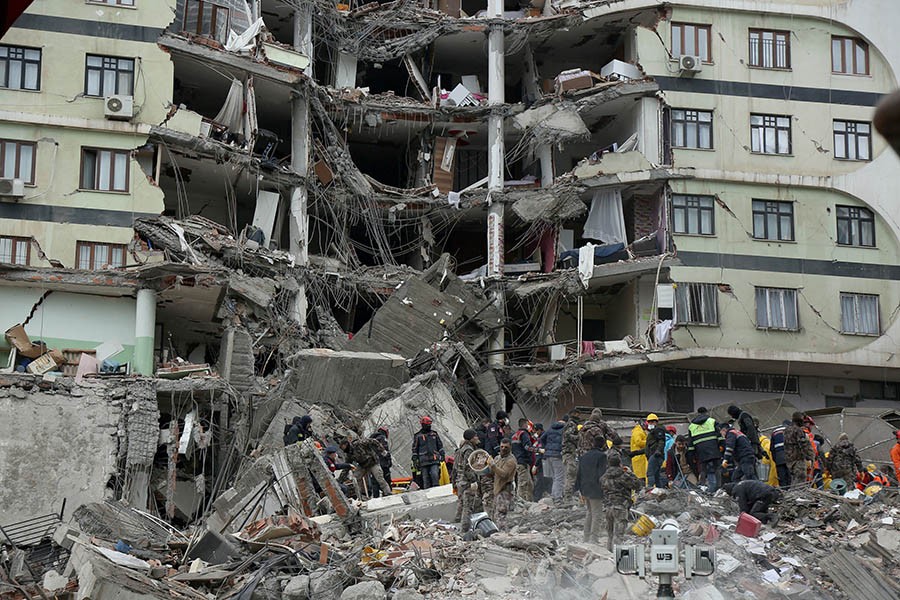The plight of hundreds of thousands of people left homeless by earthquakes in Turkey and Syria grew more desperate on Thursday, while hopes faded of many more people being found alive amid the ruins of cities.
The death toll from Monday's quakes, which struck in the early morning, passed 17,000 on Thursday across both countries, reports Reuters.
It was the biggest natural disaster to strike the region since 1999, when a similarly powerful quake killed more than 17,000 people in Turkey.
A Turkish official said the disaster posed "very serious difficulties" for the holding of an election scheduled for May 14 in which President Tayyip Erdogan has been expected face the toughest challenge in his two decades in power.
With anger simmering over the slow delivery of aid and delays in getting the rescue effort underway, the disaster is bound to play into the vote should it still go ahead.
On the ground, many people in Turkey and Syria spent a third night sleeping outside or in cars in freezing winter temperatures, their homes destroyed or so shaken by the quakes they were too afraid to re-enter.
Hundreds of thousands of people have been left homeless in the middle of winter. Many have camped out in makeshift shelters in supermarket car parks, mosques, roadsides or amid the ruins, often desperate for food, water and heat.
At a gas station near the town of Kemalpasa, people picked through cardboard boxes of clothes dropped off as donations.
In the port city of Iskenderun, Reuters journalists saw people huddled round campfires on roadsides and in half-crushed garages and warehouses. The only lights were the spotlights focused on cranes trying to remove slabs of debris.
Authorities say some 6,500 buildings in Turkey collapsed and countless more were damaged in the quake zone where some 13 million people live.
SLEEPING BY THE ROADSIDE
Turkey's AFAD disaster agency set up meeting points for people left homeless and wanting to be evacuated from the area. More than 28,000 people have been brought out so far, it said.
In Maras, people camped inside a bank, taping a sheet in the window for privacy. Others had set up on the grass median of a main road, heating instant soup on fires and wrapping themselves in blankets.
In Antakya, some 30 tents erected by the Turkish Red Crescent in a park were all packed. Many people spent the night in their cars. Few petrol stations had fuel and kilometres-long queues stretched at those that did.
In the devastated Syrian town of Jandaris, Ibrahim Khalil Menkaween walked in the rubble-strewn streets clutching a folded white body bag. He said he had lost seven members of his family including his wife and two of his brothers.
"I’m holding this bag for when they bring out my brother, and my brother’s young son, and both of their wives, so we can pack them in bags," he said. "The situation is very bad. And there is no aid."
The death toll in Turkey rose to 14,014 by Thursday morning. In Syria, already devastated by nearly 12 years of civil war, more than 3,000 people have died, according to the government and a rescue service in the rebel-held northwest.
Turkish officials say some 13.5 million people were affected in an area spanning roughly 450 km (280 miles) from Adana in the west to Diyarbakir in the east. In Syria, people were killed as far south as Hama, 250 km from the epicentre.
BAREFOOT AND BRUISED
There were still some signs of hope. Turkish footage late on Wednesday showed a few more survivors being rescued, including Abdulalim Muaini, who was pulled from his collapsed home in Hatay, where he had remained since Monday next to his dead wife.
Rescue workers dug out an injured 60-year-old woman named Meral Nakir from the rubble of an apartment block in the city of Malatya, 77 hours after the first quake struck, state broadcaster TRT showed in live coverage on Thursday.
Barefoot and her faced bruised, Nakir was wrapped in a blanket and carried to a waiting ambulance.
Many in Turkey have complained of a lack of equipment, expertise and support to rescue those trapped - sometimes even as they could hear cries for help.
Further slowing the relief effort, the main road into Antakya was clogged with traffic as residents sought to leave the disaster zone and aid trucks headed in.
After facing criticism over the initial response, Erdogan said on a visit to the disaster zone on Wednesday operations were now working normally and promised no one would be left homeless.
Nevertheless, the disaster will pose an additional challenge to the long-ruling president in the election.
Any perception the government is failing to address the disaster properly could hurt his prospects. Conversely, analysts say he could rally national support around the crisis response and strengthen his position.
One official told Reuters it was too early to make any decision on elections, noting that a three-month state of emergency had been announced and that some 15% of Turkey's population lived in the affected area.
"It seems that we have exited the election period that we'd just entered. We will look at developments but at the moment there are very serious difficulties in holding an election on May 14," he said.
SYRIA OVERWHELMED
In Syria, relief efforts are complicated by a conflict that has partitioned the country and wrecked its infrastructure. The first United Nations convoy carrying aid to northwest Syria since the quake crossed from Turkey on Thursday, witnesses and a border official said.
El-Mostafa Benlamlih, the senior U.N. aid official in Syria, said 10.9 million people had been affected by the catastrophe.
Syria's ambassador to the United Nations on Wednesday admitted the government lacked capability and equipment, blaming more than a decade of civil war and Western sanctions.
Syrian President Bashar al-Assad has chaired emergency meetings on the earthquake but has not addressed the nation in a speech or news conference.


